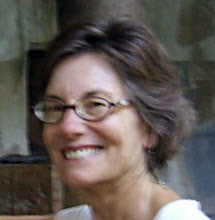Way back in Beirut, before the Beirut Exchange program started, Ute and I created the peace bracelet. She had been to the Saifi Street Fair the previous Saturday and bought some handcrafted jewelry of silver charms. Since Ute was leaving before the next fair, she invited the artist/vendor, Silva -- who, since sectarian identity is so significant in Lebanon, is Christian Armenian -- to the hotel. Ute was playing with the charms, arranging several on the table, and I joined her to create a peace bracelet. We found a crescent for Islam, a Christian cross, a 60's-era peace symbol, the Lebanese Cedar with a heart cutout (to remember the bracelet's genesis, and our meeting in Beirut), and a spiral-inscribed palm-up hand for Buddhism. I wasn't thinking when I asked loudly, do you have a Jewish star? Silva jolted to attention, and I quickly realized my faux pas, which in another location could have potentially endangered my life. One is barred from entering Lebanon if there is evidence in one's passport of having been to Israel next door. It would be impossible for Silva to have such an item in her inventory at a Lebanese street fair. I felt foolish and was grateful I was in a safe environment. We started to refer to my requested object as "nejmeh", the Arabic word for star, and carefully discussed what it should look like to compliment the other charms. Silva said she thought she could have it made and delivered to us with the completed bracelet. Ute and I ordered identical peace bracelets and loved the idea that we'd be wearing them in different parts of the (albeit Western) world.
About an hour later Ute received a call from Silva. Her craftsmen refused to make such a charm. We conferred and decided to take the incomplete bracelets anyway. We now had the challenge to complete them. We liked the idea that our peace bracelets had a "story", and that we had to collaborate to find new charms to keep them identical. We discussed the idea of seeking out multiple new charms that represented additional world religions and other images of peace.
The importance of culturally aware vigilance was heightened the next day when the Beirut Exchange started and we were given the safety briefing. Lebanon has nearly zero petty crime, but it is a zone of civil conflict and war. We were told that there is suspicion about the taking of photographs, and to always ask permission. There are a lot of military-type men on the streets. Those in green Army uniforms are respected and viewed as reliable by citizens, and better to approach than those in gray camouflage who are local cops or internal security. We were told that people would know who our group of 14 foreigners was, and to identify ourselves as students with BE if necessary.
Then we were told to pack a "grab bag". The first BE group a year earlier had come during a time of unrest, and they had to use it. It was to include our passports and other vital papers, a small bottle of water, a book (for reading at interminable checkpoint waits) a change of clothing, and an extra layer for warmth. My roommate Carolina and I did as instructed. About 12 days into the program, both of us were looking for clothing we couldn't understand how we had lost. We had forgotten about our grab bags -- and there were the missing things.
I loved Lebanon, and I was lucky that my time there was unmarked by civil unrest. It is a chaotic place in a chaotic region, and I would agree with the prevailing opinion I heard that future violence is inevitable, unfortunately. I want to return with Jim for a visit at Christmastime some year. Inshallah.
An article by Rob Nordland in today's New York Times, "Now It's a Census That Could Rip Iraq Apart" referred to the "Lebanese solution" of doing nothing in the face of severe sectarian factions vying for power in the northern Iraqi area of Kirkuk. I would love to see peace in the Middle East, but one huge obstacle to it is such strong sectarian and tribal identities willing to go to war for power.
Sunday, July 26, 2009
Subscribe to:
Post Comments (Atom)

No comments:
Post a Comment